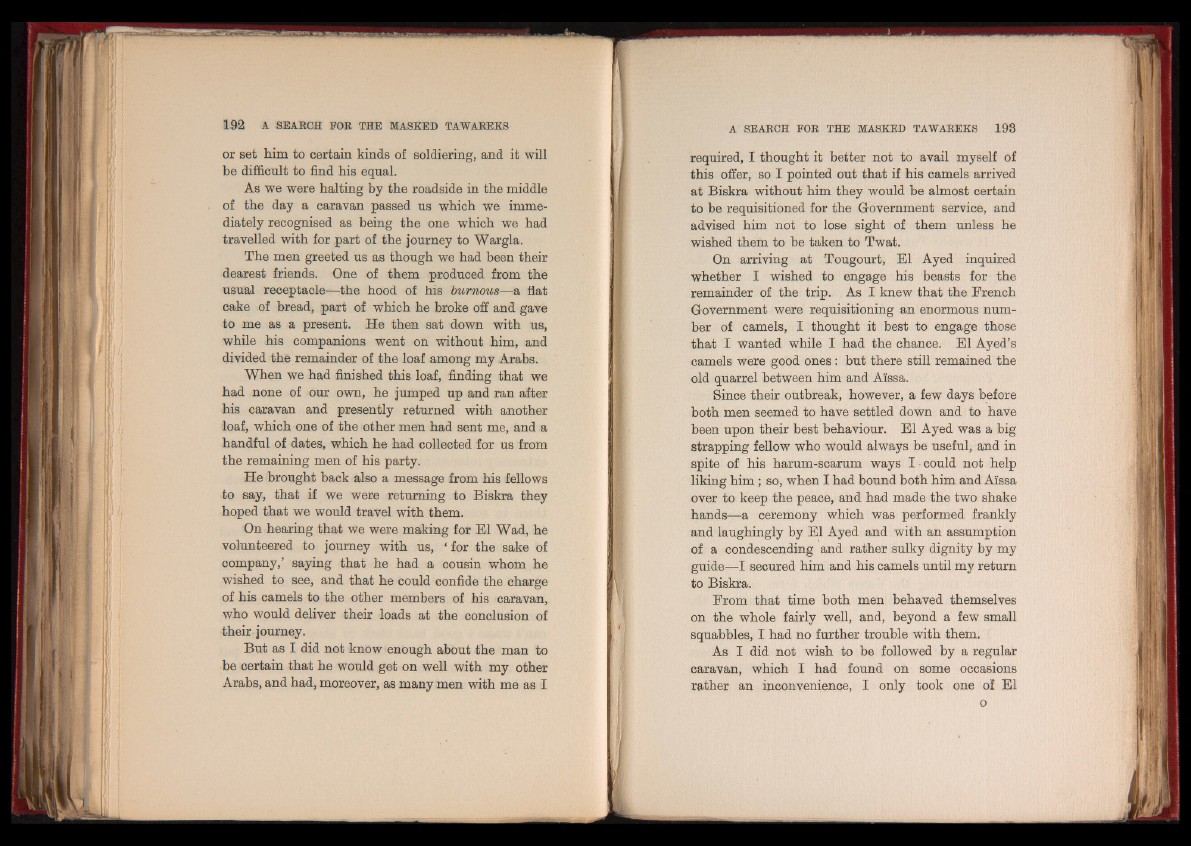
or set him to certain kinds of soldiering, and it will
be difficult to find his equal.
As we were halting by the roadside in the middle
of the day a caravan passed us which we immediately
recognised as being the one which we had
travelled with for part of the journey to Wargla.
The men greeted us as though we had been their
dearest friends. One of them produced from the
usual receptacle—the hood of his burnous—a flat
cake of bread, part of which he broke off and gave
to me as a present. He then sat down with us,
while his companions went on without him, and
divided the remainder of the loaf among my Arabs.
When we had finished this loaf, finding that we
had none of our own, he jumped up and ran after
his caravan and presently returned with another
loaf, which one of the other men had sent me, and a
handful of dates, which he had collected for us from
the remaining men of his party.
He brought back also a message from his fellows
to say, that if we were returning to Biskra they
hoped that we would travel with them.
On hearing that we were making for El Wad, he
volunteered to journey with us, ‘ for the sake of
company,’ saying that he had a cousin whom he
wished to see, and that he could confide the charge
of his camels to the other members of his caravan,,
who would deliver their loads at the conclusion of
their journey.
But as I did not know enough about the man to
be certain that he would get on well with my other
Arabs, and had, moreover, as many men with me as I
required, I thought it better not to avail myself of
this offer, so I pointed out that if his camels arrived
at Biskra without him they would be almost certain
to be requisitioned for the Government service, and
advised him not to lose sight of them unless he
wished them to be taken to Twat.
On arriving at Tougourt, El Ayed inquired
whether I wished to engage his beasts for the
remainder of the trip. As I knew that the French
Government were requisitioning an enormous number
of camels, I thought it best to engage those
that I wanted while I had the chance. El Ayed’s
camels were good ones: but there still remained the
old quarrel between him and Aissa.
Since their outbreak, however, a few days before
both men seemed to have settled down and to have
been upon their best behaviour. El Ayed was a big
strapping fellow who would always be useful, and in
spite of his harum-scarum ways I could not help
liking him; so, when I had bound both him and Aissa
over to keep the peace, and had made the two shake
hands—a ceremony which was performed frankly
and laughingly by El Ayed and with an assumption
of a condescending and rather sulky dignity by my
guide—I secured him and his camels until my return
to Biskra.
From that time both men behaved themselves
on the whole fairly well, and, beyond a few small
squabbles, I had no further trouble with them.
As I did not wish to be followed by a regular
caravan, which I had found on some occasions
rather an inconvenience, I only took one of El